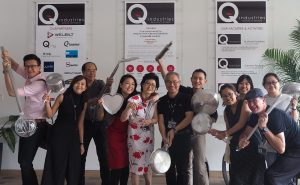Q Industries International based its successful internationalisation strategy on finding the right partners.

Founded in Singapore in 1987, Q Industries International delivers hospitality solutions to restaurants, clubs, hotels, and resort establishments in Asia Pacific and beyond. The company has expanded its footprint over the years, and today has sales offices and warehousing facilities in Malaysia and Vietnam.
The company also has an extensive global client network in markets including India, Africa, and the Middle East. BiZQ speaks with Quek Huilin, the second-generation CEO of Q Industries, who shares her experiences taking over the reins of the family business and the secret to the company’s internationalisation success.
As a family business, how challenging is the issue of succession planning?
In my case, my parents’ succession planning started while I was still in junior college. I was still considering various options for my future when they spoke to me about joining the family business after I graduated from university.
Taking up the option, I attended Ecole Hôtelière de Lausanne, a leading hospitality business school, which provided me with a solid foundation to build my career and eventually positioned me to take over the business. I also had the opportunity to spend seven months in the F&B industry as a parttime barista at Starbucks and thoroughly enjoyed the experience, and that further reinforced my passion for the industry.
After 10 years at Q Industries, I faced a different set of succession planning challenges, as I felt the need to elevate myself and the company to the next level. And it was then that I questioned if staying on in the family business was the right thing for me and the business.
My parents turned to a family friend, Christophe Megel – a multi-award-winning chef with 30 years of culinary experience under his belt – to take on the role of coach and mentor to guide me, and subsequently, my brother as well. Having an external person provide insights and perspectives helped to allay my doubts about the succession in the business and cemented my drive and commitment to bring Q Industries to new heights.
What were some considerations that influenced Q Industries’ decision to internationalise, and how did the company identify the right markets to enter?
In the early days, the decision to expand rested primarily on relationships that my mother had built over the years with clients and potential business partners. For example, our expansion into Malaysia in 1992 was due to her close connections with our business partner there.
For Vietnam, it was a Singapore client who was building a hotel in Ho Chi Minh City that got my mother to enter the market. The main business expansions that took place in the early 1990s were also a result of the relationships that my mother had nurtured with partners in Vietnam.
Our subsequent forays into other international markets were aligned to this strategy of finding the right business partners. We focus on building long-lasting partnerships, be it with distributors or suppliers and these are critical considerations in our expansion plans.
Q Industries has offices and operations across multiple countries in ASEAN. How has the COVID-19 pandemic disrupted business in the region?
COVID-19 has hit us especially hard as we are in the F&B and hospitality sectors. Like most businesses in these sectors, our clients are doing their best just to survive as developments in hotel projects have slowed down significantly. Even for projects that are ongoing, there have been major disruptions to the supply chain and manpower shortages, which have adversely affected us as well.
However, the positive aspect is that we are in diversified markets and can spread the risk across countries that have been able to manage their COVID-19 situation better. Internally, we also took the down time to revamp and streamline our processes to be more efficient. We have pivoted to a hybrid working style by digitalising our internal processes and also developed a B2B procurement platform that allows our clients to order seamlessly from us.
Beyond ASEAN, can you share more about the growth strategy that Q Industries has adopted?
Our growth strategy has always been to ensure that we have the right partners in the areas that we work in. If we cannot find partners in a market that with values aligned with ours, then we will not consider entering it. Our expansion into new markets should not be opportunistic, but rather, one based on trust and sustainability.
How has your company tapped digital technologies to further its internationalisation efforts?
We have stepped up our digitalisation efforts in the past couple of years. We started our digitalisation journey in early 2019 by shifting our entire work process online. Even when the COVID-19 pandemic hit in early 2020 and our offices in the region went into lockdown, we had minimal disruption to our operations.
Not only were we able to transition smoothly, but we also found that our productivity levels increased and there was better cooperation between our regional offices due to our digitalisation efforts.
Our Vietnam and Singapore operations started an Integrated Services initiative this year that features shared services between both offices to reduce cost and increase efficiency. Once our back-of-house was digitalised, we were able to work on bringing that initiative to our clients by launching qonlinesolutions.com in April this year and offering them a seamless experience.
Article published at: https://bizq.sbf.org.sg/building-a-global-footprint-through-relationships/

